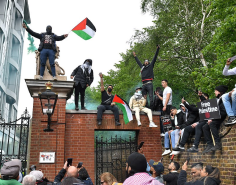No, I don’t mean Penny Mordaunt’s physical makeup. As you can see, she is what used to be called ‘a fine figure of a woman’.

Moreover, by all accounts this Tory minister (and a TA officer) is great fun. In my younger days, I could imagine going on a pub crawl with her, to have a few drinks and more laughs, exchange some bawdy stories, sing some ribald songs and see what the immediate future might bring. (In my dotage, I can only fantasise about such things, but this one is a recurrent fantasy.)
The constitution that Penny has problems with is that of the United Kingdom, with the last word giving a transparent clue that Britain still remains a monarchy. And monarchy coexists with aristocracy, there’s no getting around that.
Since time immemorial, hereditary aristocrats have sat in the House of Lords, the upper chamber of Parliament. Yet anything that has existed for centuries presents a sniping target for modern barbarians – they refuse to accept that the world had existed before they were born, and the dial isn’t reset with each new generation.
The Lords is no exception. Thus, during the orgy of constitutional vandalism, otherwise known as Tony Blair’s tenure, the number of hereditary peers sitting in the lords was limited, with most peers to be appointed by the prime minister and rubber-stamped by the Queen. At present, the Lord’s has 791 sitting members, of whom only 92 are hereditary peers.
Now, both Penny and I agree that this arrangement is an abomination. On that pub crawl of my impure dreams, we’d establish that fact between the third and fourth drinks, only to move on to less weighty subjects thereafter.
However, if we persevered with that boring subject, we’d find out that we are dissatisfied with the Lords for different reasons. I think only hereditary aristocrats (moreover, those whose peerage goes back at least a century), should sit in that chamber. Penny thinks the members should be neither hereditary nor appointed, but elected.
She advocates this arrangement in her new book, stopping just short of suggesting a name change. Why such reticence? If the House of Lords is to become like the US Senate, why stick with the outdated nomenclature?
According to Penny, having unelected members makes the Lords, a “relic”, a “mausoleum”, an “anachronism”, “as out of touch with modern democracy as it is possible to be”.
The book has been favourably peer-reviewed by all the usual suspects, Tony Blair, Bill Gates, Elton John, the film director Richard Curtis and such true-blue Tories as Boris Johnson and Ruth Davidson.
Penny castigates not just the undemocratic nature of the Lords, but also its demographics. “As hereditary titles still only pass down the male line,” she complains, “many seats in the upper chamber can only have male bottoms filling them.”
That sentence refocused my thoughts on the part of Penny’s anatomy that can be surmised from the photograph. Having pulled myself together, I had a fright. It sounds as if she wishes to abolish not only hereditary Lords, but also the institution of primogeniture.
Why stop there? If the whole political and social system has to be reduced to a show of hands (most of whom don’t know Penny’s elbow from her… well, you know), then I can point out another part of our constitution that involves unelected officials: the monarchy.
If that’s not an anachronism, a relic and a mausoleum, I don’t know what is. Would this minister of the Crown rather have the Crown abolished? While we’re at it, should we perhaps also chop off the head on which that headgear sits?
Penny is a minister in the government department responsible for constitutional reform, and I’m quaking in my boots. What act of vandalism will this lot perpetrate next?
For Penny’s benefit, the whole point of the House of Lords is that it’s unelected. Unelected means impervious to party pressures, not obligated either to issue or to receive political IOUs. The role of the Lords is to act as a counterbalance to the elected power of the Commons, preventing the lower chamber’s more egregious excesses.
This body traces its provenance back to the ancient councils of elders. Its precursor in England before the Norman conquest was the Witenagemot, the assembly of the kingdom’s leading nobles who would convene after a king’s death to select a successor.
The traditional assumption has always been that hereditary aristocrats have a vested interest not in transient political jousts, but in the constant wellbeing of the whole country to which they are umbilically linked. The monarchy and the aristocracy form an axis around which revolves the country’s history, with her generations past, present and future.
Without these institutions, Britain would be like the US, but without the money and power. We already have some feeble and superfluous pastiches of American bodies, such as the Supreme Court. Would Penny like to add the Senate to that?
Britain’s unique political dispensation is perhaps her greatest contribution to Western civilisation. Even French subversives, such as Voltaire, venerated and envied England’s politics. In the next century, Britain’s balance of various interests, estates and classes became even finer, arguably representing the highest achievement of statecraft in the West.
Moreover, unlike, say, France, the British political system is an essential part of the people’s national identity. It’s a stable system too, having remained fundamentally the same for 350 years, a period during which France has had three different monarchies, five different republics, a revolutionary government, a directory, a military dictatorship and an empire.
Yet throughout all these tribulations, France remained France, and the French remained French, proving that their political system is only tangentially important to their national essence. However, remove – or vandalise – Britain’s political system, and she won’t be Britain any longer.
Penny evidently fails to understand such constitutional basics, which doesn’t do much for the cause of putting more female bottoms into parliamentary seats… but don’t get me going on this.








